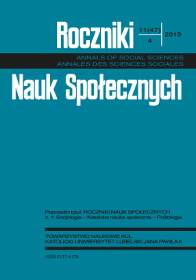Od rodziny nuklearnej Talcotta Parsonsa do wielości form życia rodzinnego współcześnie
Abstrakt
Rodzina nuklearna wspierana akceptacją społeczną długo była uznawana za obowiązujący model. Zachodzące procesy przemian demograficznych, społecznych, ekonomicznych zrobiły istotny wyłom w tym tradycyjnym podejściu. Współcześnie normą stało się współwystępowanie różnych form bliskich związków. Nasuwają się pytania: Jakie są konsekwencje tych zmian? Co oznacza to dla samego pojęcia „rodzina” ? Czy sama rodzina traci na wartości? Czy jest przyszłość dla rodziny? Nie ma jednak jednoznacznej odpowiedzi, gdyż poglądy badaczy są zróżnicowane. Życie społeczne jest jednak nieprzewidywalne. A rodzina musi się adaptować.
Bibliografia
Adams B.N.: The family. A sociological interpretation, Fort Worth, Texas: Harcourt Brace College Publishers 1995.
Adamski F.: Czy rodzina jest niezbędna w procesie integralnego rozwoju człowieka? „Roczniki Pedagogiczne” 7(43) 2015, nr 1, s. 121-136.
Adamski F.: Rodzina. Wymiar społeczno-kulturowy, Kraków: Wydawnictwo Uniwersytetu Jagiellońskiego 2002.
Beck U.: Społeczeństwo ryzyka. W drodze do innej nowoczesności, Warszawa: Wydawnictwo Naukowe Scholar 2002.
Beck U., Beck-Gernsheim E.: Individualization. Institutionalized individualism and its social and political consequences, London–Thousand Oaks–New Delhi: Sage Pablications 2002.
Biernat T.: Czy istnieje rodzina ponowoczesna?, „Paedagogia Christiana” 34(2014), nr 2, s. 183-195.
Boguszewski R.: Rodzina – jej współczesne znaczenie i rozumienie, Komunikat z badań, Warszawa: CBOS 2013, s. 10 [BS/33/2013].
Buunk B.: Alternative lifestyles from an international perspective: A trans-Atlantic comparison, w: Contemporary families and alternative lifestyles, red. E.D. Macklin, R.H. Rubin, Beverly Hills–London–New Delhi: Sage Publications 1983, s. 308-330.
Castells M.: Siła tożsamości, Warszawa: Wydawnictwo Naukowe PWN 2009.
Coleman D.: Immigration and ethnic change in low-fertility coutries: A third demographic transision, „Population and Development Review” 32(2006), No. 3, s. 401-446.
Coleman M., Ganong L.H.: Families and marital disruption, w: Family relations. Challenges for the future, red. T.H. Brubaker–Newbury Park–London–New Delhi: Sage Publications 1993, s. 112-128.
Coontz S.: Marriage, a history. How love conquered marriage, New York: Pinguin Books 2005.
Duberman L.: Marriage and its alternatives, New York–Washington: Praeger Publishers 1974.
Dyczewski L.: Więź pokoleń w rodzinie, Warszawa: ODiSS 1976.
Fargues Ph.: International migration and the demographic transition: A two-way interaction, „International Migration Review” 45(2011), No. 3, s. 588-614.
Hakim C.: A new approach to explaining fertility patterns: Preference theory, „Population and Development Review” 29(2003), No 3, s. 349-374.
Hipsz N.: O roli kobiet w rodzinie. Komunikat z badań, Warszawa: CBOS 2013 [BS/30/2013].
Kotowska I.E.: Zmiany modelu rodziny. Polska – kraje europejskie, „Polityka Społeczna” 2002, nr 4, s. 2-8.
Kotowska I.E.: Teoria drugiego przejścia demograficznego a przemiany demograficzne w Polsce w latach 1990, „Studia Demograficzne” 1998, nr 4(134), s. 3-36.
Laskowski J.: Trwałość wspólnoty małżeńskiej, Warszawa: ODiSS 1987.
Lesthaeghe R.: The unfolding story of the second demographic transition, „Population and Development Review” 36(2010), No. 2, s. 211-251.
Macklin E.D.: Nontraditional family forms: A decade of research, „Journal of Marriage and the Family” 42(1980), No. 4, s. 905-922.
Międzynarodowy Rok Rodziny – 20 lat później, http://www.hli.org.pl/drupa/pl/node/7841
Mikołajczyk-Lerman G.: Mężowie i żony. Realizacja ról małżeńskich w rodzinach wielkomiejskich, Łódź: Wydawnictwo Uniwersytetu Łódzkiego 2006.
Newman D.M.: Sociology of families, Thousand Oaks–California–London–New Delhi: Pine Forge Press 1999.
Rice F. Ph.: Intimate relationships, marriages, and families, London–Toronto: Mayfield Publishing Company Mountain View 1996.
Szukalski P.: Demograficzne przemiany rodziny – wyzwania dla współczesnych społeczeństw, „Ruch Prawniczy, Ekonomiczny i Socjologiczny” 66(2004), z. 4, s. 169-186.
Szukalski P.: Rodzina przyszłości w perspektywie demograficznej, w: Nowy ład? Dynamika struktur we współczesnych społeczeństwach, red. J. Grotowska-Leder, E. Rokicka, Łódź: Wydawnictwo Uniwersytetu Łódzkiego 2013, s. 411-427.
Tyszka Z.: System metodologiczny wieloaspektowej integralnej analizy życia rodzinnego, Poznań: Wydawnictwo Naukowe UAM 2001.
Copyright (c) 2019 Roczniki Nauk Społecznych

Utwór dostępny jest na licencji Creative Commons Uznanie autorstwa – Użycie niekomercyjne – Bez utworów zależnych 4.0 Międzynarodowe.


